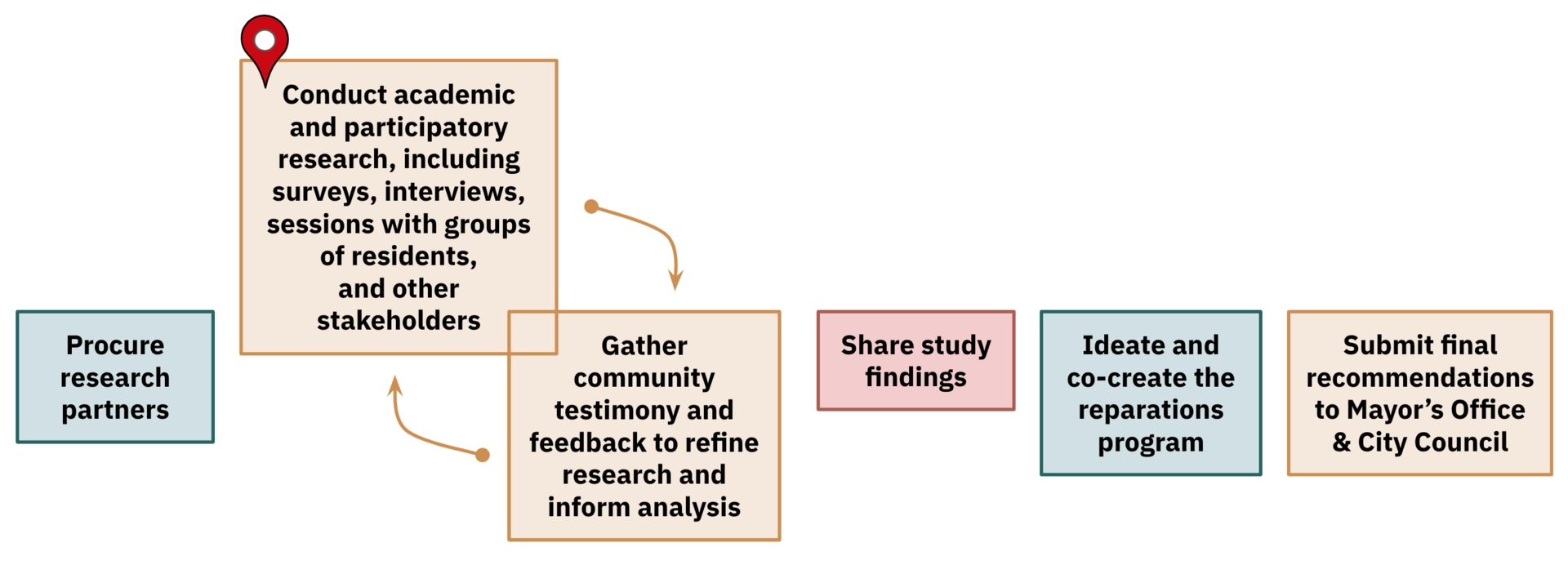- What are reparations?
-
According to Merriam-Webster Dictionary, a “reparation” can be defined as “making amends, offering expiation, or giving satisfaction for a wrong or injury.” Reparations may be provided in the form of compensation, as well as restitution, rehabilitation, satisfaction and guarantees of non-repetition. A report from the United Nations High Commissioner for Human Rights notes that reparations are only “one element of accountability and redress, and should not be purely equated with financial compensation.” Reparations may also include apologies, memorials, or institutional reforms.
- What's the Reparations Advisory Commission?
-
The Commission was established in 2021 as a Blue-Ribbon Task Force by former LA Mayor Eric Garcetti and Council Districts 8, 9, and 10. The Commission is composed of local leading voices in activism, academia, law, and racial justice. The Commission’s work is centered on LA’s jurisdiction since the City’s 1925 Charter, and has five objectives:
Develop and recommend on the format and goals of reparations for Black Angelenos Seek opportunities to fund the reparations Identify an academic partner to assist in the formal process of developing the program Maintain an active relationship with community-based organizations and key stakeholders Engage relevant experts to inform the development of the program
- What are the City of LA's plans for reparations?
-
The City of Los Angeles Reparations Advisory Commission will study the harms experienced by Black Angelenos. The harms may include physical violence or psychological terror; seizures of property or assets; housing or employment discrimination; or negative health and environmental outcomes. The study will have two major parts: Part I will uncover and chronicle what role the City may have played in harms experienced; Part II will envision and recommend to the Mayor and City Council potential reparative efforts. City leaders have the authority to implement what the Commission may recommend. The City’s efforts are independent of California’s efforts, but the Commission plans to learn and adopt beneficial and helpful practices modeled by the State’s Reparations Task Force.
- Who might benefit from an eventual LA City reparations initiative?
-
The recommendations for reparations and corresponding eligibility is to be determined. The study, which will include historic research, community testimony, and feedback will help determine eligibility.
- Will the reparations be monetary?
-
The study will explore both monetary and nonmonetary reparations. The Commission can not guarantee direct cash compensation as a result of the study.
- Why is the City of Los Angeles exploring reparations if it did not participate in chattel slavery?
-
Generations of Black Angelenos have experienced harms and the continued impacts of harms from institutional policies and practices, such as redlining, restrictive covenants, workplace, education and housing discrimination the 19th and 20th centuries. The Commission’s study — following the process below — will explore historic and contemporary issues to discover what role the City may have played in order to recommend appropriate reparations.

- Who are the study partners?
-
The Commission’s Academic Partner is California State University, Northridge College of Social and Behavioral Sciences and the Fund Development Partner is Mockingbird Analytics.
- What topics will the study cover?
-
The Commission is primarily focused on government actions since the adoption of the City’s 1925 charter. Its study will also explore the impact of harms experienced by African-Americans in Los Angeles before the 20th Century. The study will uncover harms experienced in the City of Los Angeles through the lens of the 12 topics the California State Reparations Task Force outlined in their interim report of June 2022. Topics include: • Enslavement • Racial Terror • Political Disenfranchisement • Housing Segregation • Separate and Unequal Education • Racism in Environment and Infrastructure • Pathologizing the Black Family • Control Over Creative Cultural and Intellectual Life • Stolen Labor and Hindered Opportunity • An Unjust Legal System • Mental and Physical Harm and Neglect • The Wealth Gap
- When will the study be finished?
-
The Reparations Advisory Commission began conducting its study in Spring 2023. The study is expected to be fully complete in 2024 with recommendations for city leaders on reparations by early 2025. The study’s timing is based on the need for rigorous and thorough original research about the Black experience in the City of Los Angeles, and timing may change based on the City’s organizational and operational priorities.
- How soon will reparations be disbursed?
-
The Commission is not yet at a point to recommend reparations, including eligibility, nor distribute reparations. These recommendations will follow the academic study, which is expected to be fully complete in 2024 with recommendations for city leaders on reparations by early 2025. City leadership will determine the final reparations program, what eligible participants may receive. A distribution timeline has yet to be determined.
- Are any other cities involved in the City of LA’s reparations effort?
-
No. The City of Los Angeles’ Reparations Advisory Commission will study harms that may have occurred within the geographic boundaries of the City, and is not inclusive of neighboring cities. Other cities and jurisdictions, such as the State of California, have their own reparations studies, plans or programs that are independent of the City of Los Angeles. However, the City of LA’s study does acknowledge that respondents to portions of the study, such as surveys, focus groups, or interviews may no longer live in Los Angeles, but may have valuable information to contribute about harms experienced in the city.
- How do I apply for reparations?
-
The City of Los Angeles does not currently have an application process for reparations. The Commission’s study is underway.
- How can I get involved?
-
To stay updated about events and news from the Reparations Advisory Commission, subscribe to the LA Civil Rights newsletter. Visit civilandhumanrights.lacity.org/joinus, follow us @lacivilrights on Instagram and Twitter, or call 213-978-1845. LA residents and visitors are welcome at public events. If you have questions, would like to get involved, or help us raise awareness about the Commission, email LACR-reparations@lacity.org.